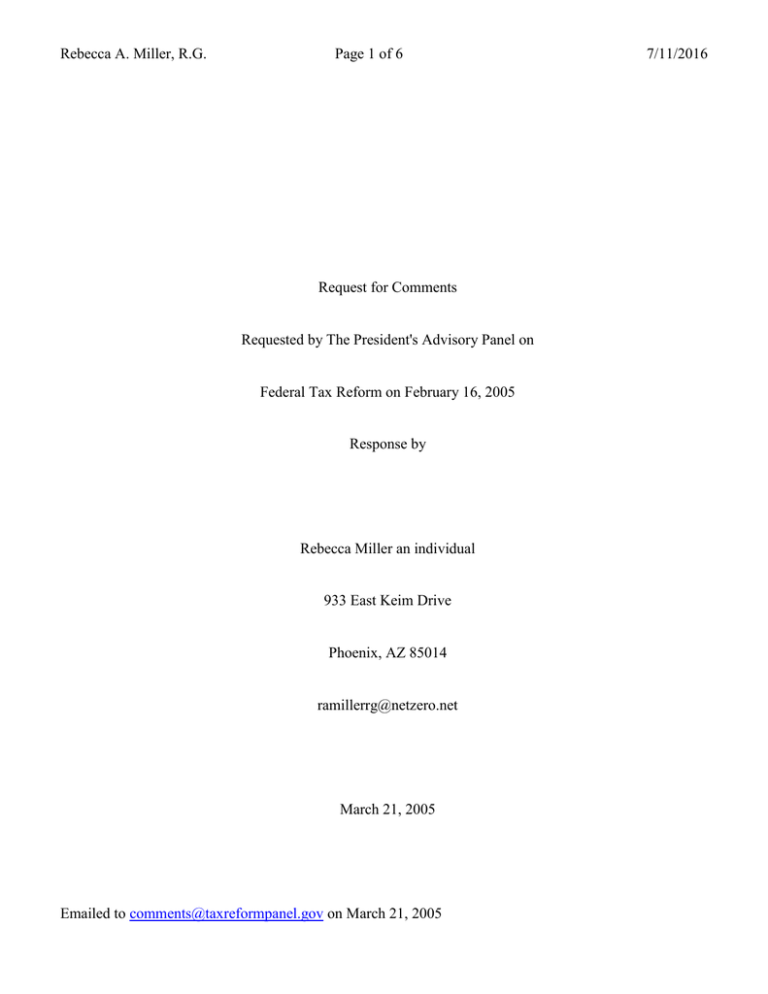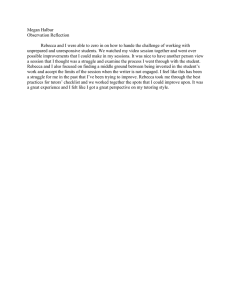Rebecca A. Miller, R.G. Page 1 of 6 7/11/2016
advertisement

Rebecca A. Miller, R.G. Page 1 of 6 Request for Comments Requested by The President's Advisory Panel on Federal Tax Reform on February 16, 2005 Response by Rebecca Miller an individual 933 East Keim Drive Phoenix, AZ 85014 ramillerrg@netzero.net March 21, 2005 Emailed to comments@taxreformpanel.gov on March 21, 2005 7/11/2016 Rebecca A. Miller, R.G. Page 2 of 6 7/11/2016 First, I would like to better understand the fact that some on the panel said there is no “political will” regarding the replacement of the income tax. I assume that means that the politicians are not interested, not that the People the politicians represent are not interested. If Fairtax H.R. 25 is not passed the People will find the will to disrupt the politician’s political will. We will vote you out. Section 1: Headaches, unnecessary complexity, and burdens that taxpayers - both individuals and businesses - face because of the existing system. The entire income tax code is a headache. The IRS publishes estimates indicating that over 40% of taxpayers are out of compliance with the code! And why not? The code is incomprehensible. The code needs to be replaced, not reformed. Compliance with the tax code is a burden shared equally by US businesses – a burden that can make up 20% of their cost of doing business due to the complexity of the tax code. This results in prices increasing by 20% for the consumer, in order to maintain profit margins. Decreasing the cost of compliance would decrease the cost of doing business. The present system puts US businesses at a disadvantage to foreign competition that does not have this burden of compliance. This puts us at a competitive disadvantage, and encourages the export of American jobs. The very aspects of the code designed to help the less wealthy (seniors/poor) do not help, as they are the least likely to seek professional help to maximize their benefits under the law. Meanwhile, the wealthy hire extensive help, allowing them to structure their affairs to absolutely minimize tax burden. In this way, a millionaire who makes $100,000 from his business and uses it to support his family by starting another business has no tax liability, as the $100,000 becomes a tax deductible business expense, while the lower class worker who picks up a part time job to provide his family with an additional $5,000 of income is taxed at a minimum of 30%, i.e. sum of 15% tax bracket, 7.5% social security/Medicare, and 7.5% employer SS/Medicare match. Rebecca A. Miller, R.G. Page 3 of 6 7/11/2016 The fact is, adding one more rule, or one more kind of tax, or one more exception designed to reduce a less fortunate individual’s liability will not help. Additional rules will not benefit the poor/elderly because they do not hire the accountants who know how to use them. And additional rules can increase the cost of compliance for businesses, which are then passed to the least fortunate anyway. Simplification is the key! Easier compliance means cheaper compliance. The system needs to be so simple that the least privileged and least educated among us will reap the full benefit of the system – not only the wealthy that can afford to have it deciphered for them. Section 2: Aspects of the tax system that are unfair. How about everyone that gets paid in cash i.e.drug dealers, smugglers, bookies, etc. They are not required to pay taxes because they don’t have reportable income. Among others are millions of otherwise lawabiding people that get paid cash but don't report it thus cheating the system. With the Fair Tax, rich or poor when you spend your money you pay into the system. The wealthy are overwhelmingly the most productive in terms of sheer dollars BECAUSE their tax burden is the lightest in terms of percentage of income paid in taxes. Give that liberty to the ones who don’t have much, maybe they can build on it. Once again, only when a system is simple enough that even the poorest and least educated receive the full benefit from the system every time will our tax code be a success. Section 3: Specific examples of how the tax code distorts important business or personal decisions. The tax code hurt my ability to save for a down payment for my first house. With 30-40% of my paycheck disappearing before it hits my hands, how can I save? Rebecca A. Miller, R.G. Page 4 of 6 7/11/2016 The tax code provides a disincentive to invest. If I want to invest $1,000 in a company, I first have to make almost $1,500 pretax. Then, that company spends 20% of its revenue on tax compliance, decreasing my return on investment. Finally, when I sell my investment, I am taxed again for any gains. Section 4: Goals that the Panel should try to achieve as it evaluates the existing tax system and recommends options for reform. Eliminate the IRS. Do not tax income; tax consumption. The only tax reform proposal that fulfills the goals of neutrality, simplicity, visibility, fairness and economic growth is also the one that is consistent with the Founders principles, the Fairtax, H.R.25. Any form of income tax fails. VAT taxes are hidden and costly to administer. The Fairtax eliminates the IRS. My suggestions are listed below: 1. Simplify Federal tax laws to reduce the costs and administrative burdens of compliance with such laws. Don’t simplify the code, abolish the code and transfer to a consumer-based tax system. With the current tax code, the poor, the elderly, and the uneducated do not maximize their benefits because they are not likely (or are not financially able) to seek the professional help that is necessary to discern and use the code in their favor. Meanwhile, the wealthy are financially able to hire consultants to find loopholes in the tax code. This is an opportunity to take a broad sweep at the tax code. Replace it en toto. 2. Share the burdens and benefits of the Federal tax structure in an appropriately progressive manner while recognizing the importance of homeownership and charity in American society The Fairtax H.R. 25 would widen the tax base to include everyone who buys something in the US. By tripling the tax base (number of people paying the tax) I would imagine that the overall % taxes paid per person (when compared to the current system) would decrease. Rebecca A. Miller, R.G. Page 5 of 6 7/11/2016 The Social Security and Medicare programs need to be funded by a more progressive tax, such as the Fairtax H.R. 25 with rebates up to the poverty line. Use this opportunity to reform taxation. That reform will help fund these other very useful government programs. The biggest difference between the rich and the poor is how much we can buy. Taxing how much we make continues to burden the middle and lower class, as the rich jump through the above mentioned loopholes (see answer to question #1). A national sales tax has no effect on a poor family receiving a monthly rebate – they will be tax-free! But those that spend more will pay the national sales tax on a new Mercedes. 3. Promote long-run economic growth and job creation, and better encourage work effort, saving, and investment, so as to strengthen the competitiveness of the United States in the global marketplace. By increasing the tax base we should be able to decrease the cost of goods thereby recapture our markets, sell more product, collect more sales tax, and pay down the national debt. Currently the value of the dollar is being depressed by all of our national debt. So every dollar that people have earned and saved is now worth less. We need to work to reverse this slide into mediocrity as a Nation. If you don’t pass the Fairtax H.R. 25 soon the result will be that the dollar will become worth less and less when compared to other currencies. Businesses in America presently spend 20% of revenues on tax code compliance, and only a sliver of that on sales tax collection. Taking away the cost/time burden of compliance with the current tax code not only decreases the cost of goods and services for American consumers, but also makes us more competitive in a global market by allowing us to offer goods and services at reduced prices. The regressive income tax is a hindrance to savings and investment, and decreases job creating by reducing our supply of business capital. The Fair Tax does not tax any of the above, thereby allowing Americans to save and invest more, and also creating more jobs with the additional investment capital. What’s wrong with more jobs, better pay, better products (made by happier people) in a nation that is not in debt? Rebecca A. Miller, R.G. Page 6 of 6 7/11/2016 The current tax code is leveraged by the rich, and burdens the poor. Revisions to the existing code or rule or exception or situation will not fix anything (just more of the same). Simplification is the key. Take massive decisive action, and promote a truly progressive tax like the Fairtax H.R. 25 with rebate up to the poverty line. Those who are truly in need of tax relief will finally have the burden lifted through a monthly sales tax rebate, while those who spend large amounts on cars, trips, and toys will pay their share. Furthermore, those in the middle who use their money to save, invest, buy a home, or start a company – helping this great nation in the best way – will no longer be taxed for their good choices! Please don’t miss this chance to fundamentally improve the lives of every American by putting more in their pocket every paycheck – and letting them keep it there when they do good things with it. -----Original Message----From: Rebecca Miller [mailto:RMiller2@azdot.gov] Sent: Monday, March 21, 2005 11:11 AM To: comments@taxreformpanel.gov Subject: President's Advisory Panel on Federal Tax Reform <<Rebecca's Comments.doc>> Please note new email address below Rebecca A. Miller, R.G. ramillerrg@netzero.net
